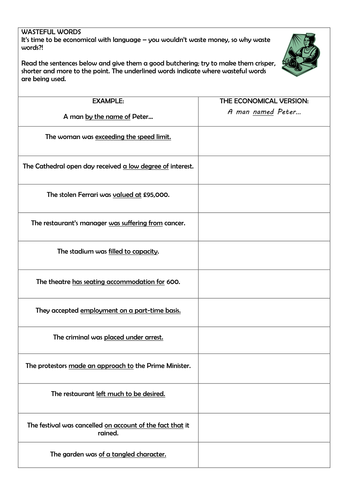
Readers want to consume the news as quickly as possible; they don’t want to excavate nuggets of meaning from mountains of words. The news needs to be written clearly, concisely and correctly – THE 3 BIG C’s.
Illustrate with the following:
Write on the board ‘FRESH FISH SOLD HERE’
The fishmonger had a sign which said ‘FRESH FISH SOLD HERE’. The fishmonger had a friend who persuaded him to rub out the word FRESH – because naturally he wouldn’t expect to sell fish that wasn’t fresh; to rub out the word HERE – because naturally he’s selling it here, in the shop; to rub out the word SOLD – because naturally he isn’t giving it away. And finally to rub out the word FRESH – because you can smell it a mile off.
Using the same principle, you can ask students which words they could remove and why.
Explain that vigorous writing is concise. A sentence should contain no unnecessary words, a paragraph no unnecessary sentences, for the same reason that a machine has no unnecessary parts. This doesn’t mean that the writer should make every sentence short, or avoid all detail. It just means that every word should TELL.
Issue Wasteful Words sheet. Discuss the example; check understanding. Students to complete the sheet by giving the sentences a good butchering. Students to to try to make the sentences crisper, shorter and more to the point. The underlined words indicate where wasteful words are being used.
After activity, ask students to complete the following sentence in their book.
Writers have to be economical with language when writing the news because…
This resource is taken from my KS3 English Newspaper/Journalism SOW which you can buy from my shop.
Illustrate with the following:
Write on the board ‘FRESH FISH SOLD HERE’
The fishmonger had a sign which said ‘FRESH FISH SOLD HERE’. The fishmonger had a friend who persuaded him to rub out the word FRESH – because naturally he wouldn’t expect to sell fish that wasn’t fresh; to rub out the word HERE – because naturally he’s selling it here, in the shop; to rub out the word SOLD – because naturally he isn’t giving it away. And finally to rub out the word FRESH – because you can smell it a mile off.
Using the same principle, you can ask students which words they could remove and why.
Explain that vigorous writing is concise. A sentence should contain no unnecessary words, a paragraph no unnecessary sentences, for the same reason that a machine has no unnecessary parts. This doesn’t mean that the writer should make every sentence short, or avoid all detail. It just means that every word should TELL.
Issue Wasteful Words sheet. Discuss the example; check understanding. Students to complete the sheet by giving the sentences a good butchering. Students to to try to make the sentences crisper, shorter and more to the point. The underlined words indicate where wasteful words are being used.
After activity, ask students to complete the following sentence in their book.
Writers have to be economical with language when writing the news because…
This resource is taken from my KS3 English Newspaper/Journalism SOW which you can buy from my shop.
Something went wrong, please try again later.
This resource hasn't been reviewed yet
To ensure quality for our reviews, only customers who have purchased this resource can review it
Report this resourceto let us know if it violates our terms and conditions.
Our customer service team will review your report and will be in touch.
£2.00
